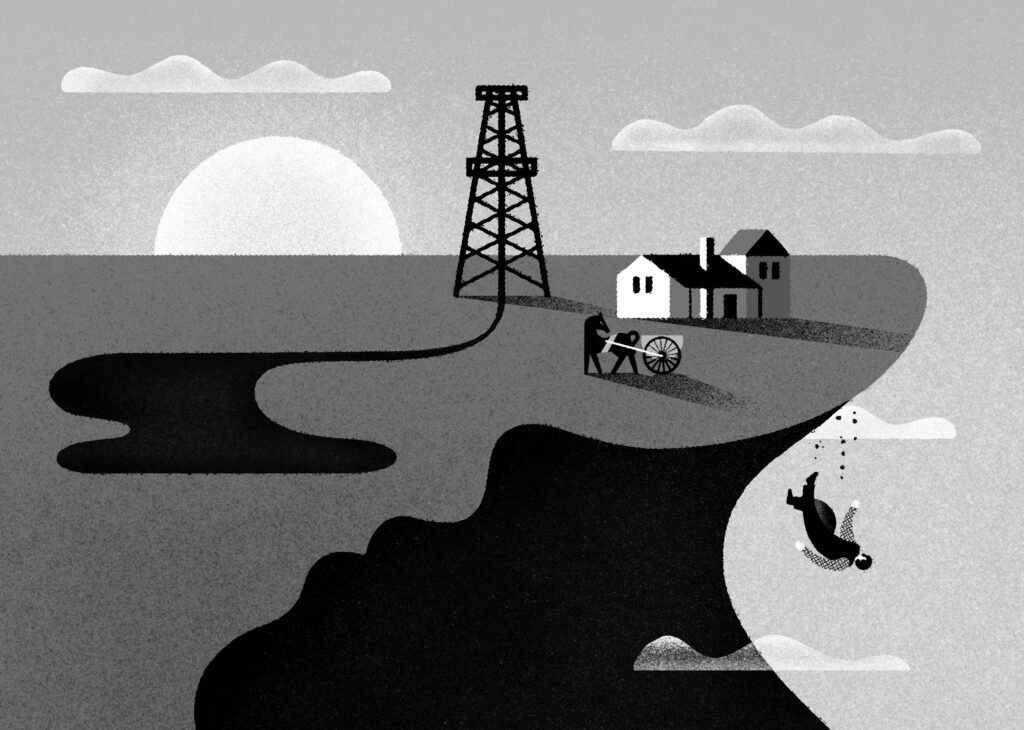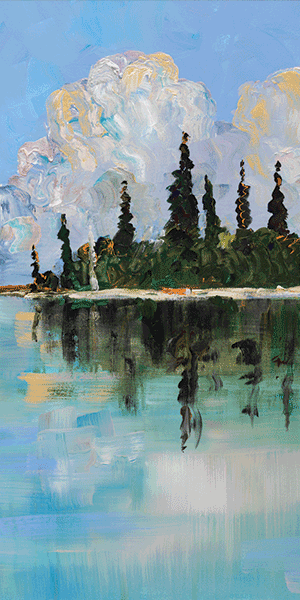In Global Warming and the Sweetness of Life, the environmentalists Matt Hern and Am Johal take a road trip to the oilsands of northern Alberta. There they are dramatically reminded how “we are all implicated in the oil economy; every single one of us is bound up with petro-logics. We are all simultaneously witness, victim, and perpetrator of climate crimes.” This perspective characterizes Oil People, David Huebert’s debut novel, which returns to the region of southwestern Ontario that was the setting of his second book of short stories, Chemical Valley.
In 1987, Jade Armbruster, a girl on the verge of fourteen, begins to feel an inexplicable connection to her ancestor Clyde. A diehard oil man, he spent years of his life in search of bitumen, stomping “on his treadle over and over,” even when it seemed futile. “Mindless of the men who had abandoned him,” he drilled throughout the 1860s, until he found success. Ultimately, he fell to his death in his own well in Lambton County. That defunct well is still part of Jade’s family’s land, where she lives with her parents and older sister, Angie. The property — which features “creeks and fieldstones, small period outbuildings, vintage manor”— is also home to the Canadian Petroleum Legacy Museum, founded by Jade’s grandmother Sandra.

The defunct oil well remains part of an Ontario family’s land and identity.
Karsten Petrat
The museum, housed in the old manor, is eerie, gloomy, and Gothic. Secrets unfurl slowly as Jade’s interest in Clyde grows. Although the intergenerational plot could be revealed with a simple sketch of their genealogy, Huebert’s descriptive, lyrical writing carries the story far beyond family dynamics. As the curious teen digs deeper into her ancestral lore, the narrative strikes a good balance between predictability and surprise. The plot unfolds circuitously but with great skill in an elegant five-part structure. Time is not linear but runs in loops and echoes, mirroring the way the past is always with us. As Jade puts it, “This is a story of remnants and revenants, of things that bubble up.”
Credibility and evidence are in question throughout. The prose switches between timelines and perspectives; it folds in reportage and the official historicization of the land. Premonitions and relics appear to Jade and invite further suspicion. Even parts of a screenplay, from a documentary about the museum, are reproduced, providing some context for the period between the 1860s and the 1980s. The film’s narrator intones, “What is perhaps most remarkable about history is not how it shaped the past but how it lives on in the present.”
A geologist in Oil People observes that history “lives on in the rock,” that oil “distills time, curves it.” Huebert’s poetic evocation of the two dark fluids — black gold and blood — allows the deep past to surface. When Jade’s mother tells her that “we’re not poor people. We’re oil people. It’s in our blood,” she feels this profoundly. She senses her innate relationship to the resource, much like Clyde’s, even though he turns out not to be her biological relative. On an outing to the well with her friend Marc, Jade has a supernatural experience: “I felt the black veins flashing beneath me, black rivers in the flesh of the rock. I felt the veins I had crawled in, the veins that crawled now in me, and I thought the words blood and stream until they turned, churned — blood stream, blood stream, blood’s dream.”
Oil has mystical properties, and it is the sole interface between family and home for the Armbrusters. Why are both Jade and Clyde so affected by it? In a diary that Jade finds in the attic, Clyde’s wife, Lise, describes him as having “a species of passion total and resolute.” She details his overwhelming, innate predilection for extraction, the years he spent “drilling and drilling as if to find his own meaning in the rock.” Huebert does not offer easy answers, and the inexplicable moments resonate well beyond the scope of the book. He asks the unanswerable: What makes us kin? How important is it to follow a feeling? And what does it mean to be connected to land that is not yours?
“Why on earth would you stay here?” a woman asks Lise. Instead of responding, she thinks, “How to tell her it was intuition, written in rock?” Instinct forms the bond between Clyde and Jade, drives most of the decisions characters make, and is the salient force behind the historical Armbruster settlement. It also becomes the reason for its downfall. Angie causes a small-town revolution with her boyfriend, Jules, who writes an exposé about petroleum extraction in the region. “Angela is a brave young woman from a family that represents much of what’s wrong with our exhausted Western culture,” reads the article. He argues that the Armbrusters “refuse to wake up to the approaching environmental crisis, refuse to address the injustices against their Native neighbours.”
Weaving together outside criticism with the abject and lonely solitudes of a local family fuel business, Huebert crafts a poignant coming-of-age story that is also a saga of intergenerational guilt. Oil People is a cautionary tale, but it does not focus on the irreversible damage corporations have done to the planet. Instead, the danger lies in what has been passed down between people. With great nuance, Huebert poses questions about complicity, inheritance, and allegiances. Through no fault of her own, Jade, like her relatives, is simultaneously a witness, victim, and perpetrator. Although she is only on the cusp of young adulthood, will she have time to reckon with the hand she’s been dealt?
Shazia Hafiz Ramji is the author of the poetry collection Port of Being. She divides her time between Toronto and London, where she’s writing a novel.

